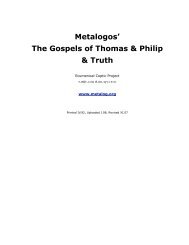Andrew Louth - Syriac Christian Church
Andrew Louth - Syriac Christian Church
Andrew Louth - Syriac Christian Church
You also want an ePaper? Increase the reach of your titles
YUMPU automatically turns print PDFs into web optimized ePapers that Google loves.
DIFFICULTY 5<br />
NOTES 213<br />
1 There is an analysis of this Difficulty by E.Bellini, in Heinzer and<br />
Schönborn (1982), 37–49.<br />
2 Denys the Areopagite, Ep. 4:1072A.<br />
3 ‘Mode’ has been used throughout this Amb. to translate tropos. ‘Mode of<br />
existence’ (tropos tês hyparxeôs) is used by the Cappadocians as<br />
equivalent to hypostasis (see chapter 4 of the Introduction, above).<br />
Throughout this Amb. Maximus makes a consistent distinction between<br />
logos which characterizes nature, and tropos (mode) which characterizes<br />
the person. It is part of the ‘Cappadocian’ or ‘Chalcedonian’ logic that<br />
Maximus strives to use in a systematic way.<br />
4 I have been unable to locate this precise form of words in Denys the<br />
Areopagite.<br />
5 From this point on Maximus comments on Denys’ Ep. 4, phrase by<br />
phrase: the quotations are from this epistle, unless otherwise identified.<br />
6 This word, proslêpsis (literally: something added), is regularly used in<br />
the Fathers to refer to the human nature assumed by the Word in the<br />
Incarnation.<br />
7 Members of a dualist-gnostic sect founded by Mani (c. 216–276), that<br />
was particularly influential in the fourth and fifth centuries. They<br />
were universally (and probably correctly) regarded by the Fathers of the<br />
<strong>Church</strong> as <strong>Christian</strong> heretics. It was alleged they regarded Christ as a<br />
mere phantom. They are thus frequently associated with Monophysites<br />
by the Orthodox: a tradition strikingly represented by Pope Leo (see<br />
Grillmeier [1987], 172–94). Much play was naturally made of the<br />
similarity of his name with the Greek for madness (mania).<br />
8 Apollinaris was a fourth-century heretic, who denied that Christ had a<br />
human soul, its place being taken by the Word of God. It was also<br />
generally believed by the Orthodox (wrongly, in fact) that he maintained<br />
that Christ brought his flesh down with him from heaven, as mentioned<br />
here (see Grillmeier [1975], 330–333).<br />
9 A quotation from the previous letter of Denys: Ep. 3:1069B.<br />
10 Allusion to Gregory Nazianzen, Sermon 39.13—‘The natures are<br />
instituted afresh, and God becomes man’—discussed by Maximus in<br />
Amb. 41, above.<br />
11 Here Maximus is interpreting the account in the Gospels of Jesus’<br />
walking on the water (Matt. 14:25ff. and parallels). His interpretation is<br />
very like that of the ‘Monophysite’ Severus of Antioch, Ep. 1 to Sergius:<br />
‘For how will anyone divide walking upon the water? For to run upon<br />
the sea is foreign to the human nature, but it is not proper to the divine<br />
nature to use bodily feet. Therefore that action is of the Incarnate Word,<br />
to whom belongs at the same time divine character and humanity<br />
indivisibly’ (trans. in Torrance [1988], 154).<br />
12 According to Denys, all negation (apophasis) in respect of God is made<br />
transcendently (kath’ hyperochên): see, e.g., Divine Names 7.2:869A.




